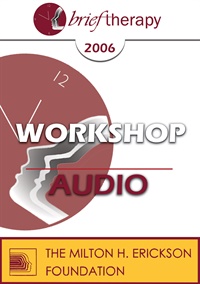BT06 Workshop 51 - Treating Troubled Adolescents - Peggy Papp, LCSW
- Average Rating:
- Not yet rated
- Topic Areas:
- Workshops | Children and Adolescent Therapy
- Categories:
- Brief Therapy Conference | Brief Therapy Conference 2006 | Pioneers in Couples and Family Therapy
- Faculty:
- Peggy Papp, ACSW
- Duration:
- 1:40:22
- Format:
- Audio Only
- Original Program Date:
- Dec 10, 2006
- License:
- Never Expires.
Description
Description: Papp presents her approach to treating troubled adolescents by focusing on the therapist’s attitude and the family's involvement. She challenges negative stereotypes and emphasizes adolescents’ sensitivity to family dynamics. Through individual and family sessions, her method addresses issues like self-harm, suicide risk, parental anger, and communication breakdowns. A featured case highlights how family therapy can reduce destructive behavior and foster support.
Syllabus Description: Many therapists dread working with adolescents because of their unpredictable high risk behavior. Although adolescents may appear disconnected and uninvolved, they are extremely sensitive to family moods, expectations and conflicts and their behavior is often a refection of what is happening in the family at any given time. This family centered approach is focused on identifying and changing the triggers both inside and outside the family that lead to destructive behavior such as substance abuse, self-mutilation, violence, depression and suicidal symptoms. Guidelines for clarifying issues, correcting distortions, opening up significant areas of communication and establishing positive interactions with family members will be demonstrated with video tapes that show the step-by-step process of change.
Educational Objectives:
- To define the triggers both inside and outside the family that contribute to the destructive behavior of the adolescent.
- To describe two resources within the family that can be used to arrive at mutually satisfying solutions.
*Sessions may be edited for content and to preserve confidentiality*
Credits
Handouts
| Timestamped Transcript (609.9 KB) | 12 Pages | Available after Purchase |
| Timestamped Transcript (640.4 KB) | 13 Pages | Available after Purchase |
| Ericksonian Learning Snapshot (249.5 KB) | 2 Pages | Available after Purchase |
Faculty

Peggy Papp, ACSW Related Seminars and Products
PEGGY PAPP, A.C.S.W., is a therapist in private practice and Co-Director of the Brief Therapy Project at the Ackerman Institute for Family Therapy in New York City. She is recipient of the lifetime achievement award from the American Family Therapy Association and the award for distinguished contribution to Marital Family Therapy from the American Association for Marital and Family Therapy. Her latest book is Couples On the Fault Line.


